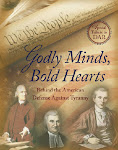Those who wish to claim America is not founded upon Christian principles predictably bring up one particular document--the Treaty of Tripoli. It serves as the foundation for their entire argument. However, using only that one document as the basis in understanding the why behind our country's dominant religion is simplistic.
--------------
Faith flourishes most sincerely without government interference
While America was not founded as a theocracy, her founding was shaped by Christian moral truths and not by secular ideas that stemmed from our colonial roots. Our founders firmly believed that our laws must coincide with God's ordained moral standards and that human laws took a back seat to moral laws. America's founding documents presuppose a Supreme Being and espouse a Christian point of view, and yet in wisdom our founders designed a constitutional order for all citizens, not just fellow believers. Our Constitution proposes that each citizen should be free to worship God (or not) as conscience motivates.
In regard to Jefferson's Letter: Thomas Jefferson once and in a personal letter used the phrase "wall of separation between church and state," and that phrase has actually displaced the true words of our First Amendment in an effort to progress that church and state shall not intertwine with one another. Note that two days after completing his letter to the Danbury Baptists, Jefferson attended church services that were being held in the U.S. Capitol. Note, too, Jefferson as President in his second inaugural address encouraged all Americans to join him in seeking “the favor of that Being in whose hands we are, who led our forefathers, as Israel of old….”
Of similar use is the otherwise obscure Treaty of Tripoli which has proven controversial for the very reason that one particular clause found in it seems to contradict our Christian roots. The one clause in the document is used to make the whole case against Christianity as the foundational religion of America.
In spite of the Treaty of Tripoli, America, nevertheless, was and is still considered a Christian nation; and though true that our founders described America as a Christian nation, there is a constitutional prohibition against a federal establishment. The national government is denied all power over religious matters.
Our Beginnings
The first Congress crafted the First Amendment. That same Congress appointed congressional chaplains and paid them! It also reauthorized the Northwest Ordinance, which held that “Religion, morality, and knowledge being necessary to good government and the happiness of mankind, schools and the means of education shall forever be encouraged.”
Furthermore, immediately after the Bill of Rights was approved by the House, Elias Boudinot recommended that a day of public thanksgiving and prayer be announced on a national level. There were fears that such a public address by the President would bring us back toward old habits of the Europeans. Out of those fears, it was recommended instead that such a religious address should be done only through the individual states.
Roger Sherman, for this momentous occasion, defended the stance of Boudinot because, according to the Annals of the Congress of the United States, the practice of thanksgiving was biblically justified:
As it turned out, the majority of the House and Senate agreed. George Washington also agreed and gladly gave the famously important 1789 Thanksgiving Day Proclamation."Mr. Sherman justified the practice of thanksgiving, on any signal event, not only as a laudable one in itself, but as warranted by a number of precedents in Holy Writ: for instance, the solemn thanksgivings and rejoicings which took place in the time of Solomon, after the building of the temple, was a case in point. This example, he thought, worthy of Christian imitation on the present occasion."
"Whereas it is the duty of all Nations to acknowledge the providence of Almighty God, to obey his will, to be grateful for his benefits, and humbly to implore His protection and favor…Continuing the tradition, religious proclamations were also issued by Adams and Madison. Jefferson as President did not issue any similarly religious proclamations but he used other forums to employ religious utterances. It is Jefferson who wrote in his "Notes on the State of Virginia,"
I do recommend…the People of these States to the service of that great and glorious Being, who is the beneficent Author of all the good that was, that is, or that will be….
And also that we may then unite in most humbly offering our prayers and supplications to the great Lord and Ruler of Nations and beseech Him to pardon our national and other transgressions, to enable us all, whether in public or private stations, to perform our several and relative duties properly and punctually; to render our national government a blessing to all the People…"
"God who gave us life gave us liberty. And can the liberties of a nation be thought secure when we have removed their only firm basis, a conviction in the minds of the people that these liberties are a gift from God? That they are not to be violated but with His wrath? Indeed I tremble for my country when I reflect that God is just, and that His justice cannot sleep forever."
Our self-governing republic requires a moral people.
Faith is an important, if not indispensable, support for morality. As previously mentioned, our founders did not want Congress to establish a national church, and there were even those who wished no establishments at the state level either. Yet on the whole they believed, as George Washington declared in his Farewell Address, that of “all the dispositions and habits which lead to political prosperity, Religion and morality are indispensable supports.”
John Adams, a deeply devout Christian, was among those aware that an established religion could bring about legal persecution of minorities and the temptation to wage holy wars. Also did he realize that a religious people were guided and united by similar moral values and beliefs.
It was Adams who declared:
"The general principles on which the fathers achieved independence were. . . . the general principles of Christianity. . . . I will avow that I then believed, and now believe, that those general principles of Christianity are as eternal and immutable as the existence and attributes of God; and that those principles of liberty are as unalterable as human nature."None of our founders believed as many do today that political leaders must avoid all religious words or that government property cannot display religious symbols. They would certainly have approved of nativity scenes or the Ten Commandments in government buildings and would have welcomed for government officials to promote Christianity. Today's ideas of total separation between church and state are irrelevant in regard to our history.
While faith flourishes most sincerely without government interference, it should not have to fight government hostility.
Words of our founders
Noah Webster explained that America was a Christian nation different from old Europe, "The ecclesiastical establishments of Europe which serve to support tyrannical governments are not the Christian religion but abuses and corruptions of it."
The Christianity practiced in America was described by John Jay as "wise and virtuous" and by John Adams as "rational."
Of no small mention is that Daniel Webster expressed in an 1844 speech to the Supreme Court, "Christianity to which the sword and the fagot [burning stake or hot branding iron] are unknown – general tolerant Christianity is the law of the land!"
What lead up to the Treaty of Tripoli
The Barbary States of North Africa (Tunis, Morocco, Algiers, and Tripoli) were in conflict against "Christian" nations, which included the United States shortly after we won our independence from England.
Justified as retaliation for what Christians long ago had done to them, the four Barbary Powers regularly attacked American merchant ships, taking their goods and enslaving the "Christian" seamen. Families and local church groups often had to participate in fundraising efforts to gather ransoms for captured individuals.
Two examples:
1784: Pirates captured U.S. schooner Maria. Those on board were taken to Algiers and imprisoned after being paraded through the streets and humiliated as "infidels."
1793: Algerian pirates captured Polly and imprisoned the crew. The captain informed the Americans they could expect harsh treatment "for your history and superstition in believing in a man who was crucified by the Jews and disregarding the true doctrine of God's last and greatest prophet, Mohammed." A Christian crew member of the Polly, John Foss, wrote of his years captive in Algiers, “As we passed through the streets, our ears were stunned with the shouts, clapping hands, and other acclamations of joy from the inhabitants, thanking god for their great success, and victories over so many Christian dogs, and unbelievers, which is the appellation they generally give to all Christians.” Journal of John Foss, Several Years a Prisoner in Algiers, 1798, Angier March, Newbury Port, Mass.
In 1793 President Washington sent Col. David Humphreys to try to negotiate treaties with Algeria, Tripoli, and Tunis. A little later, James Simpson was sent to renew the agreement we already had with Morocco because the country had a new ruler who announced his plans of attack against nations who did not negotiate peace with him.
The new Sultan agreed to the old peace treaty. He told Simpson, "The Americans, I find, are the Christian nation my father, who is in glory, most esteemed. I am the same with them as my father was, and I trust they will be so with me."
In the meantime, Washington set in motion the plans to build up our navy, which was in pitiful condition.
Col. Humphreys later assigned Joel Barlow to form the treaties with the other three Barbary nations. On October 8, 1796, Barlow commissioned Richard O'Brien to negotiate peace with Tripoli.
After negotiations were concluded, the Treaty was forwarded to the United States. President Adams submitted it for ratification, and he wrote to the Senate, "I lay before you, for your consideration and advice, a treaty of perpetual peace and friendship between the United States of America and the Bey and subjects of Tripoli, of Barbary, concluded, at Tripoli, on the 4th day of November, 1796."
Terms of the treaties
The numerous treaties of "Peace and Amity" negotiated with the Muslim Barbary nations were unfavorable to America. We were required to pay staggering amounts of money or else give outrageously expensive gifts such as a warship to each country in exchange for freedom from attacks in the Mediteranean.
The 1797 treaty with Tripoli was meant to show respect to the Muslims for their chosen religion. We assured them we were not like Christian countries of old insofar as we would not engage a "Holy War" against them. We assured them our government was not founded on the Christian religion as it has in itself no character of enmity [hatred] against the laws, religion or tranquility of Musselmen [Muslims]. Thus, we read Article XI:
As the government of the United States of America is not in any sense founded on the Christian religion as it has in itself no character of enmity [hatred] against the laws, religion or tranquility of Musselmen [Muslims] and as the said States [America] have never entered into any war or act of hostility against any Mahometan nation, it is declared by the parties that no pretext arising from religious opinions shall ever produce an interruption of the harmony existing between the two countries.It is important to note that the Article XI refers to the federal government and that religious considerations are left solely to the state governments. It is also important to note that each states' constitution as first formed is decidedly Christian.
While the Treaty of Tripoli contained the controversial Article XI, other treaties negotiated at the same time with Algiers and Tunis did not contain similar clauses.
General William Eaton
Eaton was first appointed by President John Adams as "Consul to Tunis." Under President Jefferson, he became "U.S. Naval Agent to the Barbary States," authorized to lead a military expedition against Tripoli.
By the end of the eighteenth century, the United States was behind in payments to Algiers. Joel Barlow worked to negotiate terms with Algiers which President Adams found unacceptable. Adams then sent William Eaton to negotiate more agreeable terms, but demands of Algiers and Tripoli increased, which angered Eaton to the point where he'd prefer to use military force to secure trade in the region.
Eaton's official correspondence during his service confirms that the conflict was a Muslim war against a Christian America. His letter to Secretary of State Timothy Pickering apprised Pickering of why the Muslims are such dedicated foes:
Taught by revelation that war with the Christians will guarantee the salvation of their souls, and finding so great secular advantages in the observance of this religious duty [the secular advantage of keeping captured cargoes], their [the Muslims'] inducements to desperate fighting are very powerful.When John Marshall was Secretary of State, Eaton informed him, "It is a maxim of the Barbary States, that 'The Christians who would be on good terms with them must fight well or pay well.'"
President Jefferson sent ships to blockade Tripoli. In 1803, as fate would have it, the U.S.S. Philadelphia ran aground in Tripoli, and its 300 sailors were imprisoned. Jefferson called for war.
We learn of General Eaton's thoughts through his personal journal,
April 8th. We find it almost impossible to inspire these wild bigots with confidence in us or to persuade them that, being Christians, we can be otherwise than enemies to Musselmen. We have a difficult undertaking!U.S. ships bombarded Tripoli, and the blockade was stepped up. Tripoli no longer believed we were a "feeble sect of Christians" and agreed to negotiate another peace treaty. As it turns out, the wording in the new treaty was slightly different in regard to our Christianity--it stated that the United States had no established church.
May 23rd. Hassien Bey, the commander in chief of the enemy's forces, has offered by private insinuation for my head six thousand dollars and double the sum for me a prisoner; and $30 per head for Christians. Why don't he come and take it?
While discussing the Barbary conflict with Jefferson, Adams declared:
The policy of Christendom has made cowards of all their sailors before the standard of Mahomet. It would be heroical and glorious in us to restore courage to ours.The United States agreed to pay Tripoli $60,000 in order to secure the release of the hostages captured from the Philadelphia.
Eaton returned to the United States as a hero. America realized because of his military victory, the muslims were motivated to sign a new 1806 Treaty of Tripoli, the first treaty that did not include the payment of tribute. However, Eaton was appalled that we paid ransom for the freeing of the hostages.
Shortly after the military excursion against Tripoli was successfully terminated, its account was written and published. Its title is:
First published at NewsFlavor Atheists hide the truth, guilty of fraud “Some Arab pirates were skilled bluewatersailors, and terrorized Christians 1,000 miles away. One spectacular raid all the way to Iceland in 1627 took nearly 400 captives. We think of Britain as a redoubtable seapower ever since the time of Drake, but throughout the 17th century, Arab pirates operated freely in British waters, even sailing up the Thames estuary to pick off prizes and raid coastal towns. Once in North Africa, it was tradition to parade newly-captured Christians through the streets, so people could jeer at them, and children could pelt them with refuse. At the slave market, men were made to jump about to prove they were not lame, and buyers often wanted them stripped naked again to see if they were healthy. This was also to evaluate the sexual value of both men and women; white concubines had a high value,and all the slave capitals had a flourishing homosexual underground.The pasha or ruler of the area got a certain percentage of the slave take as a form of income tax. These were almost always men, and became government rather than private property. Most of these public slaves spent the rest of their lives as galley slaves, and it is hard to imagine a more miserable existence. Men were chained three, four, or five to an oar, with their ankles chained together as well. Rowers never left their oars, and to the extent that they slept at all, they slept at their benches. Slaves could push past each other to relieve themselves at an opening in the hull, but they were often too exhausted or dispirited to move, and fouled themselves where they sat. They had no protection against the burning Mediterranean sun, and their masters flayed their already-raw backs with the slavedriver’s favorite tool of encouragement, a stretched bull’s penis or “bull’s pizzle.” There was practically no hope of escape or rescue; a galley slave’s job was to work himself to death—mainly in raids to capture more wretches like himself—and his master pitched him overboard at the first sign of serious illness.”The Life of the Late Gen. William Eaton . . . commander of the Christian and Other Forces . . . which Led to the Treaty of Peace Between The United States and The Regency of Tripoli
TREATY OF TRIPOLI, APRIL, 1806 ARTICLE XIV.
“AS the government of the United States of America has in itself no character of enmity against the laws, religion, or tranquillity of Mussulmen, and as the said States never have entered into any voluntary war or act of hostility against any Mahometan except in defense of their just rights to freely navigate the high seas, it is declared by the contracting parties that no pretext arising from religious opinions shall ever produce an interruption of the harmony existing between the two nations. And the consuls and agents of both nations respectively shall have liberty to exercise his religion in his own house. All slaves of the same religion shall not be impeded in going to said consul's house at hours of prayer.”
John Adams's Fast Day Proclamation
Begun in 1775 and adopted under the new federal government by Washington, John Adams continued the practice of issuing fast and thanksgiving day proclamations.
At a time when the nation appeared to be on the brink of a war with France, Adams urged the citizens to: "acknowledge before God the manifold sins and transgressions with which we are justly chargeable as individuals and as a nation; beseeching him at the same time, of His infinite grace, through the Redeemer of the World, freely to remit all our offences, and to incline us, by His Holy Spirit, to that sincere repentance and reformation which may afford us reason to hope for his inestimable favor and heavenly benediction." Fast Day Proclamation, 1798, John Adams. Broadside Rare Book and Special Collections Division, Library of Congress.























































































No comments:
Post a Comment